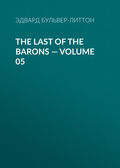
Эдвард Бульвер-Литтон
Night and Morning, Complete
“Don’t laugh—it pains me. It was not nice in grand papa; but—but, it does not mean anything. It—it—don’t laugh—Fanny feels so sad!”
“Well, you are right. Come, put on your bonnet, we will go out.”
Fanny obeyed; but with less ready delight than usual. And they took their way through lanes over which hung, still in the cool air, the leaves of the yellow autumn.
Fanny was the first to break silence.
“Do you know,” she said, timidly, “that people here think me very silly?—do you think so too?”
Vaudemont was startled by the simplicity of the question, and hesitated. Fanny looked up in his dark face anxiously and inquiringly.
“Well,” she said, “you don’t answer?”
“My dear Fanny, there are some things in which I could wish you less childlike and, perhaps, less charming. Those strange snatches of song, for instance!”
“What! do you not like me to sing? It is my way of talking.”
“Yes; sing, pretty one! But sing something that we can understand,—sing the songs I have given you, if you will. And now, may I ask why you put to me that question?”
“I have forgotten,” said Fanny, absently, and looking down.
Now, at that instant, as Philip Vaudemont bent over the exceeding sweetness of that young face, a sudden thrill shot through his heart, and he, too, became silent, and lost in thought. Was it possible that there could creep into his breast a wilder affection for this creature than that of tenderness and pity? He was startled as the idea crossed him. He shrank from it as a profanation—as a crime—as a frenzy. He with his fate so uncertain and chequered—he to link himself with one so helpless—he to debase the very poetry that clung to the mental temperament of this pure being, with the feelings which every fair face may awaken to every coarse heart—to love Fanny! No, it was impossible! For what could he love in her but beauty, which the very spirit had forgotten to guard? And she—could she even know what love was? He despised himself for even admitting such a thought; and with that iron and hardy vigour which belonged to his mind, resolved to watch closely against every fancy that would pass the fairy boundary which separated Fanny from the world of women.
He was roused from this self-commune by an abrupt exclamation from his companion.
“Oh! I recollect now why I asked you that question. There is one thing that always puzzles me—I want you to explain it. Why does everything in life depend upon money? You see even my poor grandfather forgot how good you are to us both, when—when Ah! I don’t understand—it pains—it puzzles me!”
“Fanny, look there—no, to the left—you see that old woman, in rags, crawling wearily along; turn now to the right—you see that fine house glancing through the trees, with a carriage and four at the gates? The difference between that old woman and the owner of that house is—Money; and who shall blame your grandfather for liking Money?”
Fanny understood; and while the wise man thus moralised, the girl, whom his very compassion so haughtily contemned, moved away to the old woman to do her little best to smooth down those disparities from which wisdom and moralising never deduct a grain! Vaudemont felt this as he saw her glide towards the beggar; but when she came bounding back to him, she had forgotten his dislike to her songs, and was chaunting, in the glee of the heart that a kind act had made glad, one of her own impromptu melodies.
Vaudemont turned away. Poor Fanny had unconsciously decided his self-conquest; she guessed not what passed within him, but she suddenly recollected—what he had said to her about her songs, and fancied him displeased.
“Ah I will never do it again. Brother, don’t turn away!”
“But we must go home. Hark! the clock strikes seven—I have no time to lose. And you will promise me never to stir out till I return?”
“I shall have no heart to stir out,” said Fanny, sadly; and then in a more cheerful voice, she added, “And I shall sing the songs you like before you come back again!”
CHAPTER VIII
“Well did they know that service all by rote;
Some singing loud as if they had complained,
Some with their notes another manner feigned.”
CHAUCER: Pie Cuckoo and the Nightingale,modernised by WORDSWORTH.—HORNE’s Edition.
And once more, sweet Winandermere, we are on the banks of thy happy lake! The softest ray of the soft clear sun of early autumn trembled on the fresh waters, and glanced through the leaves of the limes and willows that were reflected—distinct as a home for the Naiads—beneath the limpid surface. You might hear in the bushes the young blackbirds trilling their first untutored notes. And the graceful dragon-fly, his wings glittering in the translucent sunshine, darted to and fro—the reeds gathered here and there in the mimic bays that broke the shelving marge of the grassy shore.
And by that grassy shore, and beneath those shadowy limes, sat the young lovers. It was the very place where Spencer had first beheld Camilla. And now they were met to say, “Farewell!”
“Oh, Camilla!” said he, with great emotion, and eyes that swam in tears, “be firm—be true. You know how my whole life is wrapped up in your love. You go amidst scenes where all will tempt you to forget me. I linger behind in those which are consecrated by your remembrance, which will speak to me every hour of you. Camilla, since you do love me—you do—do you not?—since you have confessed it—since your parents have consented to our marriage, provided only that your love last (for of mine there can be no doubt) for one year—one terrible year—shall I not trust you as truth itself? And yet how darkly I despair at times!”
Camilla innocently took the hands that, clasped together, were raised to her, as if in supplication, and pressed them kindly between her own.
“Do not doubt me—never doubt my affection. Has not my father consented? Reflect, it is but a year’s delay!”
“A year!—can you speak thus of a year—a whole year? Not to see—not to hear you for a whole year, except in my dreams! And, if at the end your parents waver? Your father—I distrust him still. If this delay is but meant to wean you from me,—if, at the end, there are new excuses found,—if they then, for some cause or other not now foreseen, still refuse their assent? You—may I not still look to you?”
Camilla sighed heavily; and turning her meek face on her lover, said, timidly, “Never think that so short a time can make me unfaithful, and do not suspect that my father will break his promise.”
“But, if he does, you will still be mine.”
“Ah, Charles, how could you esteem me as a wife if I were to tell you I could forget I am a daughter?”
This was said so touchingly, and with so perfect a freedom from all affectation, that her lover could only reply by covering her hand with his kisses. And it was not till after a pause that he continued passionately,—
“You do but show me how much deeper is my love than yours. You can never dream how I love you. But I do not ask you to love me as well—it would be impossible. My life from my earliest childhood has been passed in these solitudes;—a happy life, though tranquil and monotonous, till you suddenly broke upon it. You seemed to me the living form of the very poetry I had worshipped—so bright—so heavenly—I loved you from the very first moment that we met. I am not like other men of my age. I have no pursuit—no occupation—nothing to abstract me from your thought. And I love you so purely—so devotedly, Camilla. I have never known even a passing fancy for another. You are the first—the only woman—it ever seemed to me possible to love. You are my Eve—your presence my paradise! Think how sad I shall be when you are gone—how I shall visit every spot your footstep has hallowed—how I shall count every moment till the year is past!”
While he thus spoke, he had risen in that restless agitation which belongs to great emotion; and Camilla now rose also, and said soothingly, as she laid her hand on his shoulder with tender but modest frankness:
“And shall I not also think of you? I am sad to feel that you will be so much alone—no sister—no brother!”
“Do not grieve for that. The memory of you will be dearer to me than comfort from all else. And you will be true!”
Camilla made no answer by words, but her eyes and her colour spoke. And in that moment, while plighting eternal truth, they forgot that they were about to part!
Meanwhile, in a room in the house which, screened by the foliage, was only partially visible where the lovers stood, sat Mr. Robert Beaufort and Mr. Spencer.
“I assure you, sir,” said the former, “that I am not insensible to the merits of your nephew and to the very handsome proposals you make, still I cannot consent to abridge the time I have named. They are both very young. What is a year?”
“It is a long time when it is a year of suspense,” said the recluse, shaking his head.
“It is a longer time when it is a year of domestic dissension and repentance. And it is a very true proverb, ‘Marry in haste and repent at leisure.’ No! If at the end of the year the young people continue of the same mind, and no unforeseen circumstances occur—”
“No unforeseen circumstances, Mr. Beaufort!—that is a new condition—it is a very vague phrase.”
“My dear sir, it is hard to please you. Unforeseen circumstances,” said the wary father, with a wise look, “mean circumstances that we don’t foresee at present. I assure you that I have no intention to trifle with you, and I shall be sincerely happy in so respectable a connexion.”
“The young people may write to each other?”
“Why, I’ll consult Mrs. Beaufort. At all events, it must not be very often, and Camilla is well brought up, and will show all the letters to her mother. I don’t much like a correspondence of that nature. It often leads to unpleasant results; if, for instance—”
“If what?”
“Why, if the parties change their minds, and my girl were to marry another. It is not prudent in matters of business, my dear sir, to put down anything on paper that can be avoided.”
Mr. Spencer opened his eyes. “Matters of business, Mr. Beaufort!”
“Well, is not marriage a matter of business, and a very grave matter too? More lawsuits about marriage and settlements, &c., than I like to think of. But to change the subject. You have never heard anything more of those young men, you say?”
“No,” said Mr. Spencer, rather inaudibly, and looking down.
“And it is your firm impression that the elder one, Philip, is dead?”
“I don’t doubt it.”
“That was a very vexatious and improper lawsuit their mother brought against me. Do you know that some wretched impostor, who, it appears, is a convict broke loose before his time, has threatened me with another, on the part of one of those young men? You never heard anything of it—eh?”
“Never, upon my honour.”
“And, of course, you would not countenance so villanous an attempt?”
“Certainly not.”
“Because that would break off our contract at once. But you are too much a gentleman and a man of honour. Forgive me so improper a question. As for the younger Mr. Morton, I have no ill-feeling against him. But the elder! Oh, a thorough reprobate! a very alarming character! I could have nothing to do with any member of the family while the elder lived; it would only expose me to every species of insult and imposition. And now I think we have left our young friends alone long enough.
“But stay, to prevent future misunderstanding, I may as well read over again the heads of the arrangement you honour me by proposing. You agree to settle your fortune after your decease, amounting to L23,000. and your house, with twenty-five acres one rood and two poles, more or less, upon your nephew and my daughter, jointly—remainder to their children. Certainly, without offence, in a worldly point of view, Camilla might do better; still, you are so very respectable, and you speak so handsomely, that I cannot touch upon that point; and I own, that though there is a large nominal rent-roll attached to Beaufort Court (indeed, there is not a finer property in the county), yet there are many incumbrances, and ready money would not be convenient to me. Arthur—poor fellow, a very fine young man, sir,—is, as I have told you in perfect confidence, a little imprudent and lavish; in short, your offer to dispense with any dowry is extremely liberal, and proves your nephew is actuated by no mercenary feelings: such conduct prepossesses me highly in your favour and his too.”
Mr. Spencer bowed, and the great man rising, with a stiff affectation of kindly affability, put his arm into the uncle’s, and strolled with him across the lawn towards the lovers. And such is life—love on the lawn and settlements in the parlour.
The lover was the first to perceive the approach of the elder parties. And a change came over his face as he saw the dry aspect and marked the stealthy stride of his future father-in-law; for then there flashed across him a dreary reminiscence of early childhood; the happy evening when, with his joyous father, that grave and ominous aspect was first beheld; and then the dismal burial, the funereal sables, the carriage at the door, and he himself clinging to the cold uncle to ask him to say a word of comfort to the mother, who now slept far away. “Well, my young friend,” said Mr. Beaufort, patronisingly, “your good uncle and myself are quite agreed—a little time for reflection, that’s all. Oh! I don’t think the worse of you for wishing to abridge it. But papas must be papas.”
There was so little jocular about that sedate man, that this attempt at jovial good humour seemed harsh and grating—the hinges of that wily mouth wanted oil for a hearty smile.
“Come, don’t be faint-hearted, Mr. Charles. ‘Faint heart,’—you know the proverb. You must stay and dine with us. We return to-morrow to town. I should tell you, that I received this morning a letter from my son Arthur, announcing his return from Baden, so we must give him the meeting—a very joyful one you may guess. We have not seen him these three years. Poor fellow! he says he has been very ill and the waters have ceased to do him any good. But a little quiet and country air at Beaufort Court will set him up, I hope.”
Thus running on about his son, then about his shooting—about Beaufort Court and its splendours—about parliament and its fatigues—about the last French Revolution, and the last English election—about Mrs. Beaufort and her good qualities and bad health—about, in short, everything relating to himself, some things relating to the public, and nothing that related to the persons to whom his conversation was directed, Mr. Robert Beaufort wore away half an hour, when the Spencer’s took their leave, promising to return to dinner.
“Charles,” said Mr. Spencer, as the boat, which the young man rowed, bounded over the water towards their quiet home; “Charles, I dislike these Beauforts!”
“Not the daughter?”
“No, she is beautiful, and seems good; not so handsome as your poor mother, but who ever was?”—here Mr. Spencer sighed, and repeated some lines from Shenstone.
“Do you think Mr. Beaufort suspects in the least who I am?”
“Why, that puzzles me; I rather think he does.”
“And that is the cause of the delay? I knew it.”
“No, on the contrary, I incline to think he has some kindly feeling to you, though not to your brother, and that it is such a feeling that made him consent to your marriage. He sifted me very closely as to what I knew of the young Mortons—observed that you were very handsome, and that he had fancied at first that he had seen you before.”
“Indeed!”
“Yes: and looked hard at me while he spoke; and said more than once, significantly, ‘So his name is Charles?’ He talked about some attempt at imposture and litigation, but that was, evidently, merely invented to sound me about your brother—whom, of course, he spoke ill of—impressing on me three or four times that he would never have anything to say to any of the family while Philip lived.”
“And you told him,” said the young man, hesitatingly, and with a deep blush of shame over his face, “that you were persuaded—that is, that you believed Philip was—was—”
“Was dead! Yes—and without confusion. For the more I reflect, the more I think he must be dead. At all events, you may be sure that he is dead to us, that we shall never hear more of him.”
“Poor Philip!”
“Your feelings are natural; they are worthy of your excellent heart; but remember, what would have become of you if you had stayed with him!”
“True!” said the brother, with a slight shudder—“a career of suffering—crime—perhaps the gibbet! Ah! what do I owe you?”
The dinner-party at Mr. Beaufort’s that day was constrained and formal, though the host, in unusual good humour, sought to make himself agreeable. Mrs. Beaufort, languid and afflicted with headache, said little. The two Spencers were yet more silent. But the younger sat next to her he loved; and both hearts were full: and in the evening they contrived to creep apart into a corner by the window, through which the starry heavens looked kindly on them. They conversed in whispers, with long pauses between each: and at times Camilla’s tears flowed silently down her cheeks, and were followed by the false smiles intended to cheer her lover.
Time did not fly, but crept on breathlessly and heavily. And then came the last parting—formal, cold—before witnesses. But the lover could not restrain his emotion, and the hard father heard his suppressed sob as he closed the door.
It will now be well to explain the cause of Mr. Beaufort’s heightened spirits, and the motives of his conduct with respect to his daughter’s suitor.
This, perhaps, can be best done by laying before the reader the following letters that passed between Mr. Beaufort and Lord Lilburne.
From LORD LILBURNE to ROBERT BEAUFORT, ESQ., M.P.
“DEAR BEAUFORT,—I think I have settled, pretty satisfactorily, your affair with your unwelcome visitor. The first thing it seemed to me necessary to do, was to learn exactly what and who he was, and with what parties that could annoy you he held intercourse. I sent for Sharp, the Bow Street officer, and placed him in the hall to mark, and afterwards to dog and keep watch on your new friend. The moment the latter entered I saw at once, from his dress and his address, that he was a ‘scamp;’ and thought it highly inexpedient to place you in his power by any money transactions. While talking with him, Sharp sent in a billet containing his recognition of our gentleman as a transported convict.
“I acted accordingly; soon saw, from the fellow’s manner, that he had returned before his time; and sent him away with a promise, which you may be sure he believes will be kept, that if he molest you farther, he shall return to the colonies, and that if his lawsuit proceed, his witness or witnesses shall be indicted for conspiracy and perjury. Make your mind easy so far. For the rest, I own to you that I think what he says probable enough: but my object in setting Sharp to watch him is to learn what other parties he sees. And if there be really anything formidable in his proofs or witnesses, it is with those other parties I advise you to deal. Never transact business with the go between, if you can with the principal. Remember, the two young men are the persons to arrange with after all. They must be poor, and therefore easily dealt with. For, if poor, they will think a bird in the hand worth two in the bush of a lawsuit.
“If, through Mr. Spencer, you can learn anything of either of the young men, do so; and try and open some channel, through which you can always establish a communication with them, if necessary. Perhaps, by learning their early history, you may learn something to put them into your power.
“I have had a twinge of the gout this morning, and am likely, I fear, to be laid up for some weeks.
“Yours truly,“LILBURNE.
“P.S.—Sharp has just been here. He followed the man who calls himself ‘Captain Smith’ to a house in Lambeth, where he lodges, and from which he did not stir till midnight, when Sharp ceased his watch. On renewing it this morning, he found that the captain had gone off, to what place Sharp has not yet discovered.
“Burn this immediately.”
From ROBERT BEAUFORT, ESQ., M.P., to the LORD LILBURNE.
“DEAR, LILBURNE,—Accept my warmest thanks for your kindness; you have done admirably, and I do not see that I have anything further to apprehend. I suspect that it was an entire fabrication on that man’s part, and your firmness has foiled his wicked designs. Only think, I have discovered—I am sure of it—one of the Mortons; and he, too, though the younger, yet, in all probability, the sole pretender the fellow could set up. You remember that the child Sidney had disappeared mysteriously,—you remember also, how much that Mr. Spencer had interested himself in finding out the same Sidney. Well,—this gentleman at the Lakes is, as we suspected, the identical Mr. Spencer, and his soi-disant nephew, Camilla’s suitor, is assuredly no other than the lost Sidney. The moment I saw the young man I recognised him, for he is very little altered, and has a great look of his mother into the bargain. Concealing my more than suspicions, I, however, took care to sound Mr. Spencer (a very poor soul), and his manner was so embarrassed as to leave no doubt of the matter; but in asking him what he had heard of the brothers, I had the satisfaction of learning that, in all human probability, the elder is dead: of this Mr. Spencer seems convinced. I also assured myself that neither Spencer nor the young man had the remotest connection with our Captain Smith, nor any idea of litigation. This is very satisfactory, you will allow. And now, I hope you will approve of what I have done. I find that young Morton, or Spencer, as he is called, is desperately enamoured of Camilla; he seems a meek, well-conditioned, amiable young man; writes poetry;—in short, rather weak than otherwise. I have demanded a year’s delay, to allow mutual trial and reflection. This gives us the channel for constant information which you advise me to establish, and I shall have the opportunity to learn if the impostor makes any communication to them, or if there be any news of the brother. If by any trick or chicanery (for I will never believe that there was a marriage) a lawsuit that might be critical or hazardous can be cooked up, I can, I am sure, make such terms with Sidney, through his love for my daughter, as would effectively and permanently secure me from all further trouble and machinations in regard to my property. And if, during the year, we convince ourselves that, after all, there is not a leg of law for any claimant to stand on, I may be guided by other circumstances how far I shall finally accept or reject the suit. That must depend on any other views we may then form for Camilla; and I shall not allow a hint of such an engagement to get abroad. At the worst, as Mr. Spencer’s heir, it is not so very bad a match, seeing that they dispense with all marriage portion, &c.—a proof how easily they can be managed. I have not let Mr. Spencer see that I have discovered his secret—I can do that or not, according to circumstances hereafter; neither have I said anything of my discovery to Mrs. B., or Camilla. At present, ‘Least said soonest mended.’ I heard from Arthur to-day. He is on his road home, and we hasten to town, sooner than we expected, to meet him. He complains still of his health. We shall all go down to Beaufort Court. I write this at night, the pretended uncle and sham nephew having just gone. But though we start to-morrow, you will get this a day or two before we arrive, as Mrs. Beaufort’s health renders short stages necessary. I really do hope that Arthur, also, will not be an invalid, poor fellow! one in a family is quite enough; and I find Mrs. Beaufort’s delicacy very inconvenient, especially in moving about and in keeping up one’s county connexions. A young man’s health, however, is soon restored. I am very sorry to hear of your gout, except that it carries off all other complaints. I am very well, thank Heaven; indeed, my health has been much better of late years: Beaufort Court agrees with me so well! The more I reflect, the more I am astonished at the monstrous and wicked impudence of that fellow—to defraud a man out of his own property! You are quite right,—certainly a conspiracy.
“Yours truly, “R. B.”
“P. S.—I shall keep a constant eye on the Spencers.
“Burn this immediately.”
After he had written and sealed this letter, Mr. Beaufort went to bed and slept soundly.
And the next day that place was desolate, and the board on the lawn announced that it was again to be let. But thither daily, in rain or sunshine, came the solitary lover, as a bird that seeks its young in the deserted nest:—Again and again he haunted the spot where he had strayed with the lost one,—and again and again murmured his passionate vows beneath the fast-fading limes. Are those vows destined to be ratified or annulled? Will the absent forget, or the lingerer be consoled? Had the characters of that young romance been lightly stamped on the fancy where once obliterated they are erased for ever,—or were they graven deep in those tablets where the writing, even when invisible, exists still, and revives, sweet letter by letter, when the light and the warmth borrowed from the One Bright Presence are applied to the faithful record? There is but one Wizard to disclose that secret, as all others,—the old Grave-digger, whose Churchyard is the Earth,—whose trade is to find burial-places for Passions that seemed immortal,—disinterring the ashes of some long-crumbling Memory—to hollow out the dark bed of some new-perished Hope:—He who determines all things, and prophesies none,—for his oracles are uncomprehended till the doom is sealed—He who in the bloom of the fairest affection detects the hectic that consumes it, and while the hymn rings at the altar, marks with his joyless eye the grave for the bridal vow.—Wherever is the sepulchre, there is thy temple, O melancholy Time!







